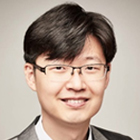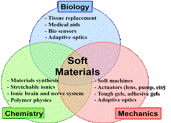Keynote Speaker

Biomimetic Approaches with Stretchable Ionics
Jeong-Yun Sun (Seoul National University)
Education & Career: Professor in Materials Science & Engineering (MSE) at Seoul National University (SNU) in South Korea. 2023-Current
Associate Professor in MSE at SNU in South Korea. 2018-2023
Assistant Professor in MSE at SNU in South Korea. 2014-2018
Post-Doctoral Fellow in School of Engineering and Applied Science at Harvard University in USA. 2012-2014
Doctor of Philosophy in MSE at SNU in South Korea. 2012
Master of Science in MSE at SNU in South Korea. 2007
Bachelor of Science in MSE at SNU in South Korea. 2005
Biography: Jeong-Yun Sun is currently a professor in the Department of Materials Science and Engineering at Seoul National University (SNU), Republic of Korea. He got his B.S. (2005), M.S. (2007) and Ph.D. (2012) in Materials Science and Engineering at Seoul National University. During his Ph.D., he had stayed at Harvard University for 4 years as a visiting student. After getting Ph.D. (2012), he started to work as a postdoctoral fellow in School of Engineering and Applied Sciences at Harvard University. After his Post-Doc., he came back to SNU and worked as an assistant professor and an associate professor for 9 years. His research was focused on developing ionic materials and devices. Dr. Sun has published many high impact peer-reviewed journal papers including Nature, Science, and Advanced Materials etc. He became a member of the Young Korean Academy of Science and Technology (YKAST) in 2021. He has received honorable awards including “Top 100 National R&D Outstanding Achievements.” from Korean Ministry of Science and ICT (2020), “Top 10 Nanotechnologies” from Korean Ministry of Science and ICT (2019), “Scientist in this Month” from Korean Ministry of Science (2018), “Young Scientist Award” from The Polymer Society of Korea (2017) and “Young Scientist Award” from Korean Materials Research Society (2016).
Research Interests: Multi-Functional Soft Materials
- Materials for tissue replacements and medical aids.
- Solid state ionic devices for bio-medical uses.
- Bio-inspired ionic brain and nerve system.
- Soft machines (actuators and sensors).
- Stretchable Ionics.
